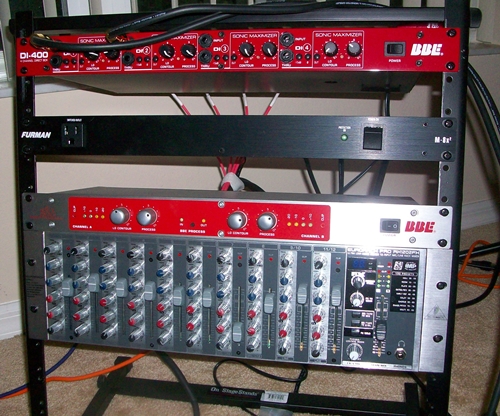The focus is live playing. Much of what I have to say about micing drums will be from that perspective. For studio micing I encourage you to check our Micing Drums, a free guide in PDF format.
One final caveat: I personally believe in playing - as much as possible and practical - without microphones. However, there are outside venues that require some form of drum kit amplification, and there are music genres that demand the same inside or outside. Factor my aversion to microphones when reading this.
In my post about surprisingly good drum mics I discussed an inexpensive, but adequate set of microphones (Nady DMK-5 microphone set). If you look at a typical small band PA, like the Peavey XR 8300, you'll see that the drummer's mics would eat up five of the eight available channels.

I can pretty much assure you that isn't going to happen unless the drummer owns the PA, and even then common sense would probably prevail.
One way to apply common sense (and save money) is to use XLR splitters

At thirteen bucks a pair, you have just concentrated four channels into two (still making it three channels for the drummer when the bass drum mic is factored in.) Still, that leaves five channels for the band.
To assuage any concerns about sharing channels, remember this scenario is a live playing situation. Studios are a different animal and not covered here (although some of the concepts may be applicable.)
If you absolutely, positively have to mic every drum and cymbal, you can feed two channels of your main mixer from an unpowered mixer. That will also give you some control over the levels. Here is one example of an unpowered mixer with enough input channels to mic a fairly large drum kit:

Another approach, which is discussed in Micing Drums, is to dispense with individual drum micing and use overhead microphones instead. The guide discusses condenser mics, but I am more of a fan of dynamic microphones for live situations. First, they require no phantom power, and are sturdier. And most cost less than condenser mics.
A very safe choice is the tried and true Shure SM57. Nobody ever got fired for using those. Personally, I prefer the Blue Microphones enCORE 100.

Blue Microphones enCORE 100

My reason is it is a much hotter mic than the SM57 and can be run directly into your mixer channel.
Before going further, a word about overheads versus micing each drum. When you are micing each drum you can get away with using the splitters I mentioned above. When using overheads, though, I recommend using two and giving them their own channel. This allows you to set the levels individually for a decent stereo sound (a reason to use overheads in the first place). And, of course, you should give the kick drum its own channel regardless of your mic placement approach.
Back to the SM57 vs. Blue Microphones enCORE. Most bands already have either the SM57 or Shure's other wildly popular mic, the
SM58, making buying another model of microphone an unnecessary expense. There is nothing wrong with using either the Shure SM57 or the SM58 as overhead mics. They work well as are in smaller venues. For outside, though, I would run them through a pre-amp like the Alesis Tube Duo Stereo Tube Microphone Preamplifier.

I have discovered that this pre-amp works wonders with the Shure SM57 and SM58 Microphones. It also works well with cheaper mics that are bundled with some PA systems. What these mics have in common is they do not have a very hot signal, so the boost provided by the tube pre makes a major improvement in how the mic responds.
The Blue Microphones enCORE 100 does not need this boost. In fact, even with minimum gain they start feeding back very quickly.
At this point I am going to stop and continue in my next post. Remember my caveats: I am not a professional sound engineer and this discussion is centered on live playing. Also, remember that my philosophy is that micing drum kits should be done as a last resort. In music there is such a thing as dynamic range that each musician should be able to play within and control. Adding gear is no substitute for technique. That said, check out my next post.
No comments:
Post a Comment